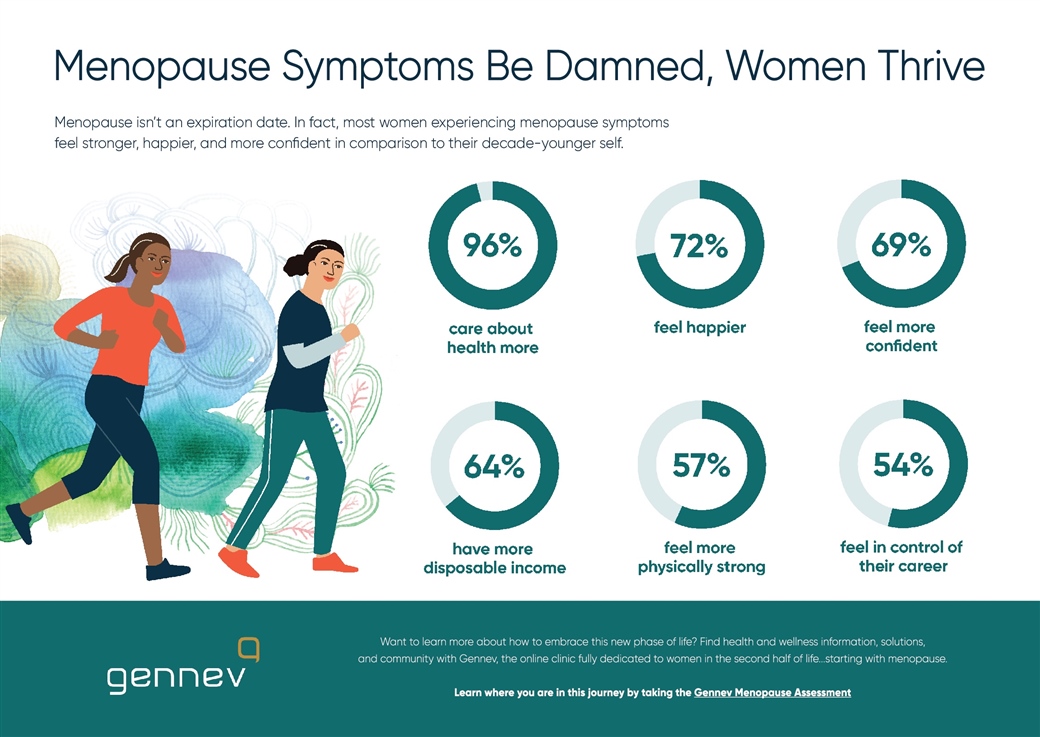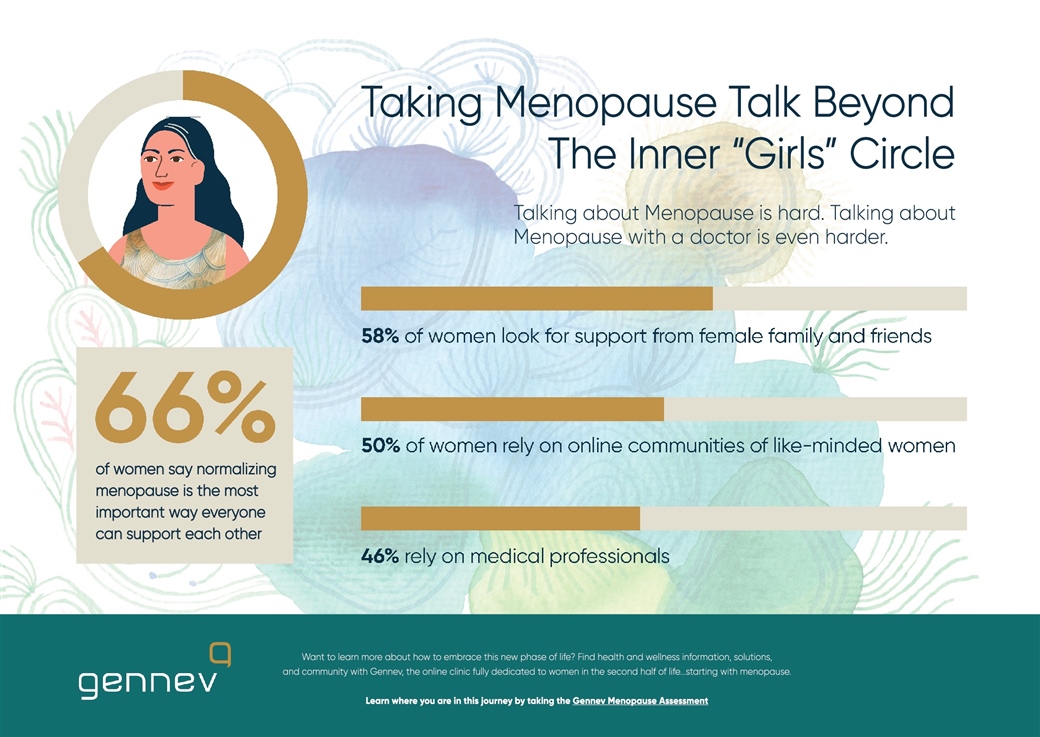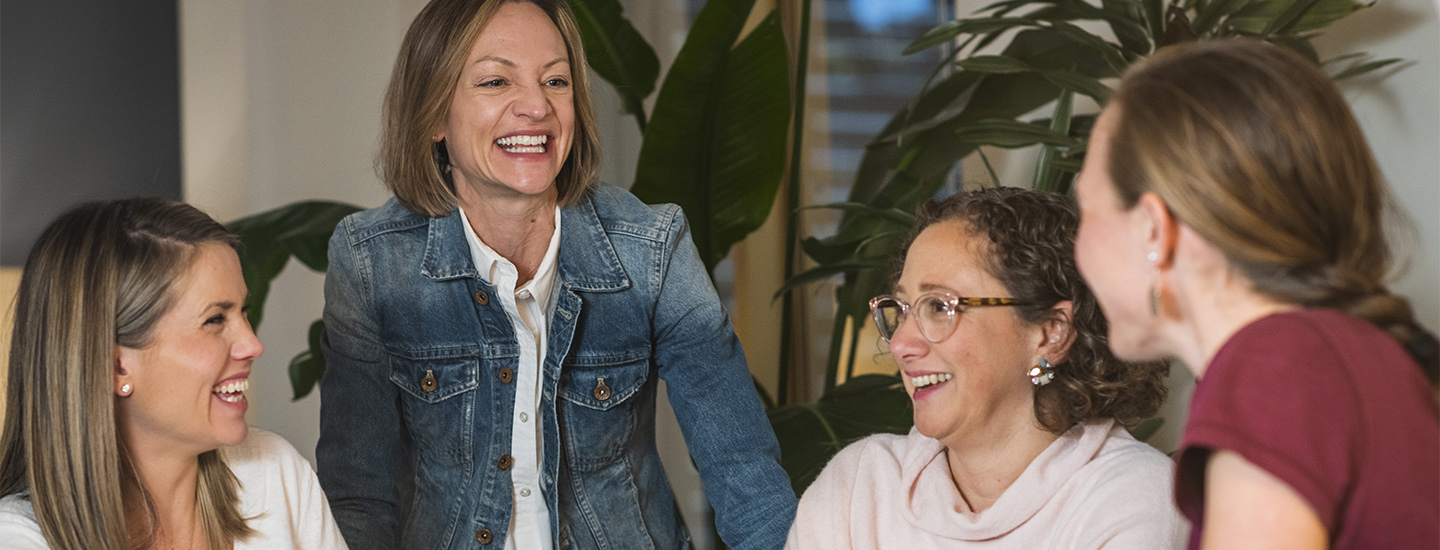Menopause health concerns of fatigue , mood changes, and sleep disturbances lead the list of challenges with alarming impact on quality of life, but 94 percent of women don’t get enough support to manage side effects. Gennev, a first-of-its-kind online menopause clinic for women, today announced the first annual Menopause Zeitgeist, the largest survey of its kind with results from more than 6,000 women. The Menopause Zeitgeist captures the top perimenopause and post-menopause symptoms women faced in 2019 “ and what women want in 2020.

Introducing Zeitgeist Menopause Statistics
Although menopause is about as universal a condition as we can imagine (everyone born with a uterus goes through it, if they live long enough), the experience of menopause is as individual as the person going through it.
The amount of time the transition takes can range from months to years. Symptoms run the gamut from non-existent to life-altering. Some get amazing support from knowledgeable professionals. Some suffer alone, not sure what’s going on or how to manage the challenges.
And because our society still largely regards menopause as some sort of shameful secret, many of us feel like we’re out here on our own.
That’s changing. Wow, is it changing.
Modern menopause
Women are speaking up and speaking out, unwilling to let perimenopause and menopause derail their careers, dreams, relationships, health, or quality of life anymore. With women like Jennifer Aniston, Jennifer Lopez, and Gwen Stefani showing what 50 can look like, 2019 has been a celebration of women in midlife and a demonstration of what life can truly be on the far side of the menopause divide.

Menopause is now a topic of discussion on mainstream media as well as the subject of popular books such as Darcey Steinke’s Flash Count Diary, and getting “ at last! “ researched by scientists like Dr. Lisa Mosconi.
At Gennev, we’re loving being at the center of this new and swelling menopause zeitgeist, connecting women with the health care experts, products, and services that can help them feel great, and helping women connect with each other and find strength in a menopause group.
What is the new zeitgeist?
Books, talk shows, and cultural conversations aside, what matters is how the women in the thick of it are feeling about their experience. At Gennev, we recently conducted a survey of more than 6,000 women, asking about their menopause symptoms and the impacts those symptoms have on their lives.
Know your body better: learn your menopause type by taking our OB/GYN-designed Menopause Assessment
Women in menopause are thriving
This new spirit of the age reflects a new confidence. The good news is women are thriving through and beyond the transition: We’re feeling happier (72 percent), physically stronger (57 percent), more confident (69 percent), and more in control of our careers (54 percent) now than we did when we were 10 years younger.
But we could use more support
Where there’s “room for improvement”? There are some pretty important gaps that need to be addressed. Mainly, women are getting through this on their own, and any “thriving” that’s happening is happening in spite of menopause, not in harmony with it.

The biggest issue? We’re still not getting the support we need. Only 33 percent of the women we surveyed felt fully supported by their partners, and more than half (54 percent) felt undersupported by medical professionals. If you can’t turn to your doctor or partner for help as or even just to be heard as menopause becomes a much harder journey than it needs to be.
“Menopause is natural and normal, but a woman can almost feel like she’s going crazy when doctors or those close to them are dismissive of midlife complaints, of their pain, or are not well-informed about menopause,” said Dr. Rebecca Dunsmoor-Su, OB/GYN, North American Menopause Society (NAMS)-certified practitioner, and Chief Medical Officer at Gennev. “We want women and all those who support them to feel more prepared for this life stage, and make sure they have someone and somewhere they can go to understand what’s happening with their bodies and to feel supported.”
We need support and solutions for women in menopause
Menopause is a natural process, not a disease “ which makes words like “symptoms” problematic. But the mental and physical discomforts women are experiencing are very real. Many women experience symptoms so dramatic they’re having a real impact on their quality of life.
Fatigue led the list for our sample, with 85 percent reporting experiencing the exhaustion that isn’t relieved by more sleep. Of those, 66 percent said fatigue interfered with quality of life.
Mood changes, particularly irritability, anxiety, and depression were close behind, with 80 percent reporting experiencing one or more mood impact and 69 percent saying mood issues affected their quality of life.
Sleep disturbances affected a whopping 78 percent of our respondents, and more than half of those said interrupted sleep impacted their quality of life.
More than half surveyed also reported impacts from menopausal belly fat, menstrual issues (usually heavy and/or frequent periods), night sweats, hot flashes, musculoskeletal changes like joint pain, loss of libido, digestive difficulties, and menopause brain fog.
What do we do from here?
Menopause is a thorny problem. Because it varies from woman to woman, even hour to hour within a single woman, “solving for menopause” resists any one-size-fits-all answer. But there are obvious steps we can take to help make women’s lives easier.
- Normalize menopause. Some are ready to share their #MyMenopauseStory with the world; others would just like to be able to experience a hot flash without feeling embarrassed, but regardless of degree, the majority of our surveyed women think society should regard menopause as the normal, natural, nothing-to-be-ashamed-of process that it is. Why is this so important?
- Research causes and solutions. Because what isn’t seen is rarely studied. We do a lot of research on menopause at Gennev, and the sheer volume of “we don’t know why this happens,” and “medical science isn’t entirely sure why this works,” and frankly, shrugging going on is infuriating. Realizing how many women’s lives are “interrupted” to greater or lesser degree by their symptoms is an important step towards pointing more research in the direction of understanding and helping.
- Get informed. Not only did women want their medical professionals to be better informed about menopause, they felt it would be helpful if their partners had more information. One big call-out from the survey: “don’t take my menopause symptomspersonally.” Forty-six percent of our women wanted their partners to understand that irritability wasn’t necessarily (entirely?) about them; 43 percent would like their partner to be more educated; 38 percent would appreciate more patience.
- Help. Other challenges that women could use help with were balancing work and life (44 percent) and prioritizing self-care (38 percent). Those who wish to help a menopausal woman thrive could do so by helping relieve some of the external pressure: offering flexible work schedules and menopause-friendly offices and taking on more of the burden of housework and care giving could go a long way to making a menopausal woman’s life better.
Thriving now, preparing for later
Lack of information isn’t just inconvenient: it can be dangerous. We were surprised by how relatively few women were concerned about the risks of heart disease, osteoporosis, and Alzheimer’s disease.
Deaths from osteoporotic hip fractures outnumber deaths from breast cancer, yet only 16 percent of those surveyed reported bone density as a concern. Cardiovascular health likewise was low on the list at 23 percent.
Because the choices women make in perimenopause and early post-menopause can have profound impacts on long-term health, we want to begin educating and preparing women now.
So what are we doing? Gennev continues to offer more and more for women in menopause: a network of menopause-specialist physicians and coaches, products that actually help relieve symptoms, a robust and growing community of women and their supporters, and information that’s vetted by medical professionals, so you know you can trust it. And we’ll continue to accrue data to help bring about more research, more understanding, and more solutions.
As Jill Angelo, CEO and co-founder of Gennev, puts it: “Our goal in releasing this data is to reduce the stigma around menopause, help women understand that they are not alone, and to create support systems at home, work, and in healthcare.”
In January, Gennev will release its 2020 Guide to Menopause, a resource women and those who appreciate them can use to understand menopause and its challenges. With more statistics like the ones above, plus tips on managing symptoms and building a healthy foundation for the rest of your life, the 2020 Guide to Menopause will help you thrive through the transition and beyond.


